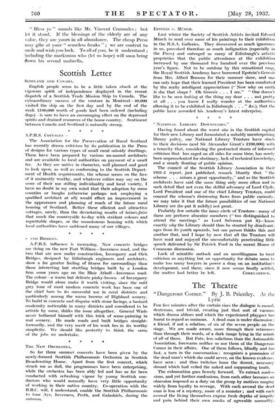" Narioxaf. LIBRARY DOWNSTAIRS."
Having found about the worst site in the Scottish capital for their new Library and formulated a suitably unenterprising library policy, our National Library Trustees have stuck to their decisions (and Sir Alexander Grant's £100,000) with a tenacity that, considering the protracted storm of informed criticism that has raged on all sides for some time, has surely been unprecedented for obstinacy, lack of technical knowledge, and a steady flouting of public opinion.
. The council of the Scottish Library Association in their 1931-2 report, just published, remark bluntly that . " the scheme . . . misses a great opportunity," and as the Scottish architects have said the same thing only more often and in such detail that not even the skilful advocacy of Lord Clyde. Lord President and one of the chief Library Trustees, could conceal the scheme's distressing flaws from public curiosity. we may take it that the future possibilities of our National Library are (to put it mildly) not great.
Probably few outside the inner circle of Trustees—many of them arc perforce absentee members (" too distinguished to attend the meetings " as Lord Salvesen put it)—know exactly why the Library should thus he stunted by disadvant- ages from its youth upwards, but one person thinks this and another that, and I hope by now that all the Trustees will have read and enjoyed the uncomfortably penetrating little speech delivered by Sir Patrick Ford in the recent House of Commons discussion.
Lack of scientific outlook and an unwillingness to treat criticism as anytl ' g but an opportunity for debate seem to make too many lawyers in power a drag on an institution's development, and there, since it now seems finally settled,
the matter had better be left. DORRYARR








































 Previous page
Previous page